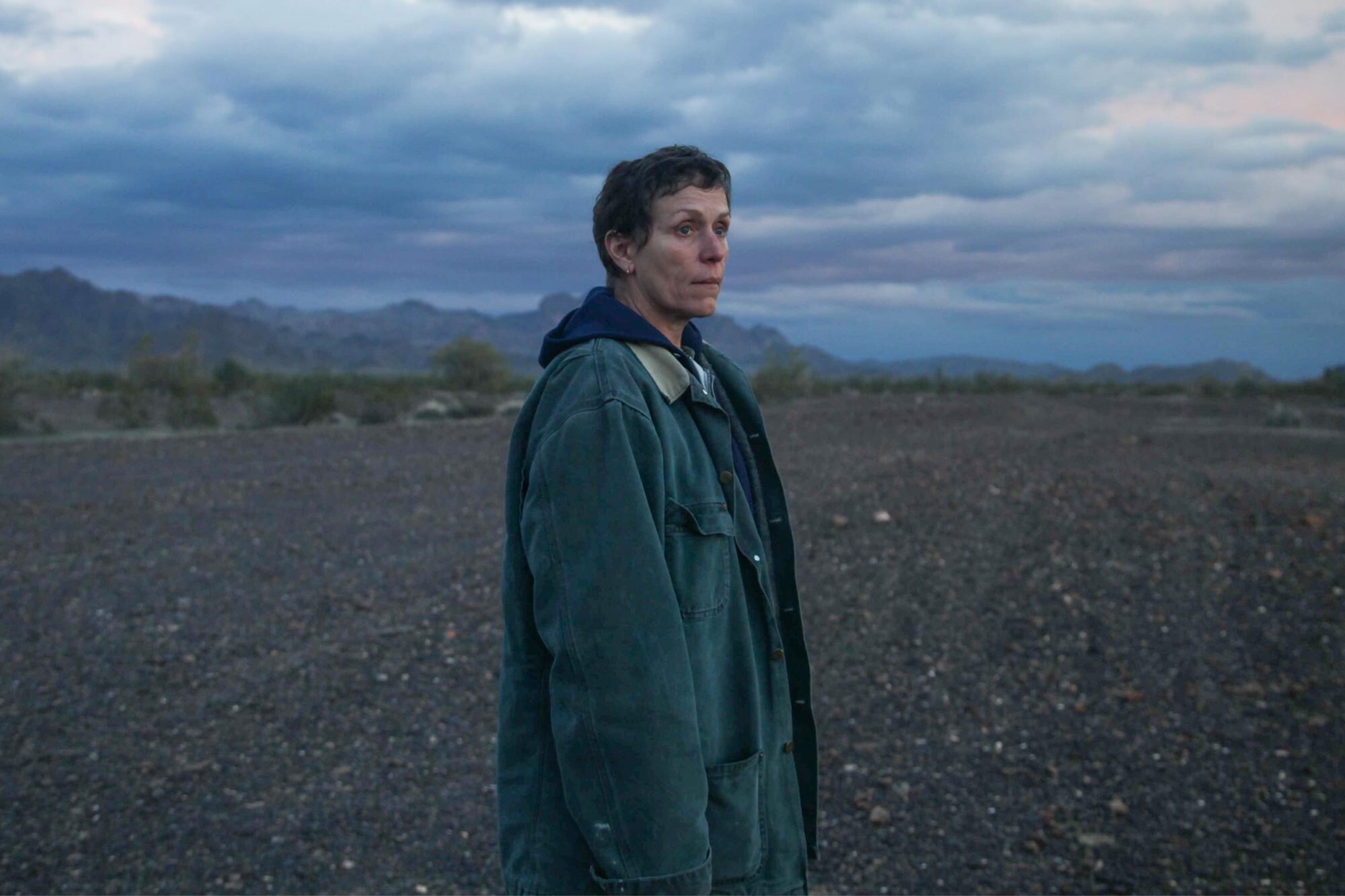[TIFF 2020] REVIEW: ‘Nomadland’ offers unexpected shelter
Frances McDormand stars in Nomadland, written and directed by Chloé Zhao.
Whether it was planned or not, the timing of Chloé Zhao’s new film Nomadland couldn’t be more poignant. As the COVID-19 pandemic grinds on, it feels like each day brings a new discovery about how some aspect of life has changed. We all found out pretty quickly what was truly essential, and what was just a luxury. And while I’m one of the lucky ones whose job could move largely online, many more have had their existences turned upside down, inside out, and kicked to the curb.
Nomadland isn’t about a public health crisis, but it does use the last catastrophic economic downturn, the Great Recession, as its springboard. In Empire, Nevada in 2011, a sheetrock factory unceremoniously shuts down, causing the town around it to crumble like a damaged piece of drywall. One of its residents is Fern (Frances McDormand), whose husband died several years previously. Out of money, Fern packs some meagre belongings into a panel van and hits the road. She picks up work at an Amazon warehouse, docking her van at a company-subsidized RV park and getting to know some of her fellow itinerant package slingers.
From there, Fern ventures into the titular world of modern-day American nomads; it’s a subculture I wasn’t aware of, something I likely share with a lot of people who experience this movie over the next few months. These nomads bounce from state to state, picking up odd jobs in food service, warehouses, national parks, wherever they can earn a bit of money for gas and food. Along the way, they gather in warmer climates to build their community, swapping supplies and know-how. And even though a comfortable suburban streaming viewer might find it odd, few people in Nomadland, Fern included, are looking for a way out. What might have started as their last option has become their preferred way to live.
Zhao’s film presents a paradox. We agree that having a home is a human right, and the ravages of late-stage capitalism have caused a phenomenon of employees without fixed addresses in a first world country. But what is the definition of a “home”? Does it have to be the nuclear family ideal of a tidy, detached house or a charming apartment? Many of the people in the nomad community couldn’t be happier. They are free to travel as they please, without the responsibilities that come with keeping up a piece of real estate. It’s a lot grittier than the manicured illusion of #vanlife on Instagram - a quick scene lays out the benefits of different sizes of toilet buckets - but it’s the most free you can be without becoming a totally off-the-grid hermit.
For her part, Fern is hardworking, friendly, and takes everything in stride. Other than some cold nights where she huddles in a sleeping bag inside her van, we rarely worry about her living to see the next day. And now that her roots to a “normal” life are severed, she doesn’t feel compelled to embed them again. She rebuffs an offer from her sister to live in her house, as well as a quasi-romantic overture from a former nomad (David Strathairn) that would mean a comfortable house in California. You could accuse her of being too restless and afraid of commitment, but Fern isn’t running away out of fear - it’s more like she’s just in tune with her own bare-bones needs.
Much of Nomadland consists of conversations Fern has with other travellers, who are almost all played by real-life nomads playing themselves, or lightly fictionalized versions of themselves. This lends the movie a documentary-like quality, where McDormand is less a distinct character and more of a brilliantly camouflaged interviewer. I don’t know how much preparation the filmmakers had to put into making these people comfortable with the process, but whatever went into it should be taught in journalism schools. It’s also a testament to McDormand’s performance that she feels fully embedded; she neither “cleans up” nomad life for Hollywood nor comes across as a patronizing celebrity shining a light on a marginalized group.
To be sure, there are aspects of the movie that wear out their welcome. There are a handful too many magic-hour sequences, so it can seem like nothing important happens to the nomads when the light’s not juuust right. The movie also clamps on a few too many endings, leaving us to wonder what Zhao’s final argument is. But these don’t detract much from what will surely be a classic American film in ten years’ time, when the current calamity is (hopefully) solidly in our past. Zhao appears to be ideally equipped for capturing microcosms of American life, so we can only wonder what she’ll make of what we’re living through right now.
Nomadland gets four stars out of four.
Stray thoughts
It would have been very funny if a couple of iPhone-toting millennials stumbled through in a scene where they try to fit in with real nomads.
Regardless of how free the nomads feel, there’s something bleak about how Amazon workers live in RV parks while the sheetrock company built actual houses for their workforce.


